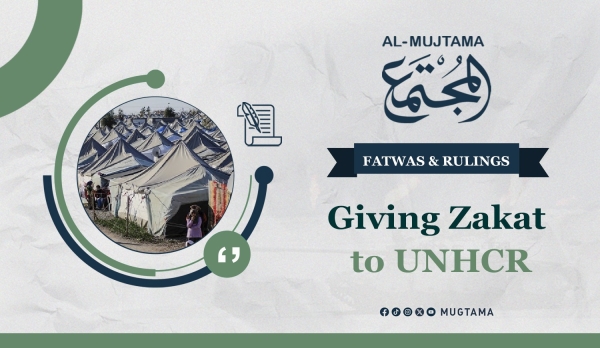Islamic Scholars Rule Against Giving Zakat to UNHCR
On Tuesday, 25th Ramadan 1446 AH / 25th March 2025, the Public Affairs Fatwa Committee, an independent fatwa-issuing body, issued a ruling prohibiting the payment of zakat to the United Nations High Commissioner for Refugees (UNHCR).
The fatwa referenced information available on the UNHCR's website about its Zakat Fund, its mechanisms, and its operations in 136 countries worldwide, where it serves 8 million refugees.
The fatwa clarified that the Public Affairs Fatwa Committee does not oppose the work of the UNHCR but rather appreciates its humanitarian efforts globally. However, it ruled that individuals and institutions should not direct their zakat payments to the UNHCR. This prohibition was based on several key points, the most significant of which is the scholarly differences in opinion regarding the delegation of paying zakat to non-Muslims. The Hanafi and Shafi'i schools permit it, while the Maliki and Hanbali schools prohibit it. However, this applies only when the authority overseeing zakat collection is a Muslim entity that delegates some non-Muslims to assist, not the other way around. Delegation implies that the authority supervising zakat is Muslim while utilizing the help of some non-Muslim individuals. This is not the case with the UNHCR, where all its heads since its establishment in 1950 have been non-Muslims. Moreover, the collection of zakat falls under religious jurisdictions, which require Islam, as Allah say, “And never will Allah give the disbelievers over the believers a way [to overcome them].” (An-Nisa: 141)
The fatwa also based its ruling on the fact that the UNHCR operates in 136 countries, with most of its beneficiaries being non-Muslims, whereas zakat is strictly designated for Muslims. Additionally, there is a possibility that zakat funds collected by the UNHCR may be used to pay its employees, most of whom are non-Muslims and therefore do not qualify as those employed to manage the zakat. Furthermore, the UNHCR does not distribute zakat immediately but delays it for up to a year, which deprives the poor of its timely benefits, as zakat should ideally reach its rightful recipients without delay.
The ruling also highlighted the presence of trustworthy Islamic organizations across the Muslim world, including national zakat institutions supervised by Islamic governments, making an external organization unnecessary.
The Public Affairs Fatwa Committee is an independent body composed of several prominent Islamic scholars from across the Muslim world, including: Sheikh Muhammad al-Hassan al-Dido from Mauritania, Dr. Othman Shabir from Jordan, Dr. Muhammad Yousry from Egypt, Dr. Abdul-Hay Yusuf from Sudan, Dr. Ahmad Saeed Hawa from Syria, Dr. Raafat Muhammad Rashid Miqati from Lebanon, Dr. Fatih Aydın, Deputy Head of the Supreme Council for Religious Affairs in Turkey, Dr. Mustafa Dadaş from Konya University, Dr. Belkheir Tahari Idrissi from Algeria, Dr. Muhammad Salem al-Dido from Mauritania, Dr. Masoud Sabri from Egypt, and others.
-------------------------------------------------------------


